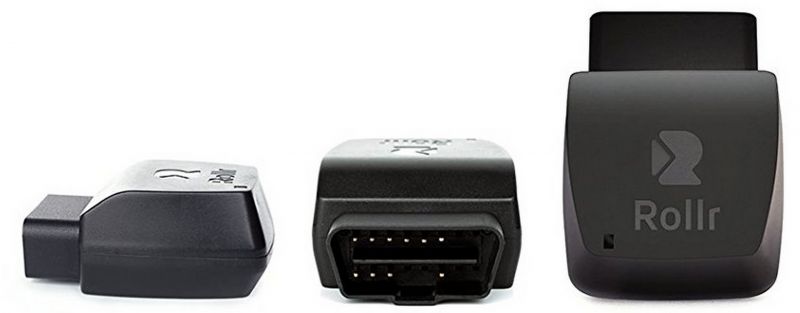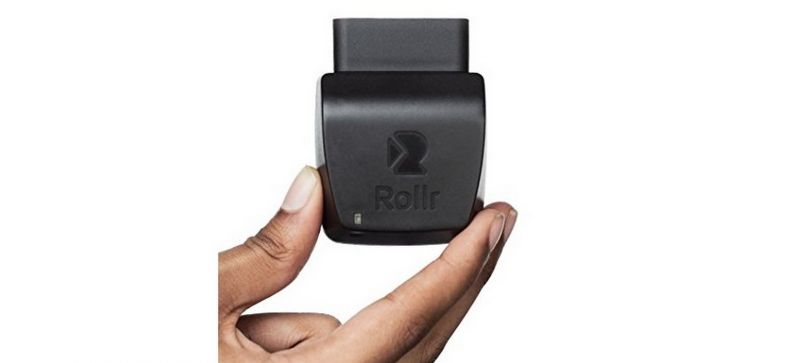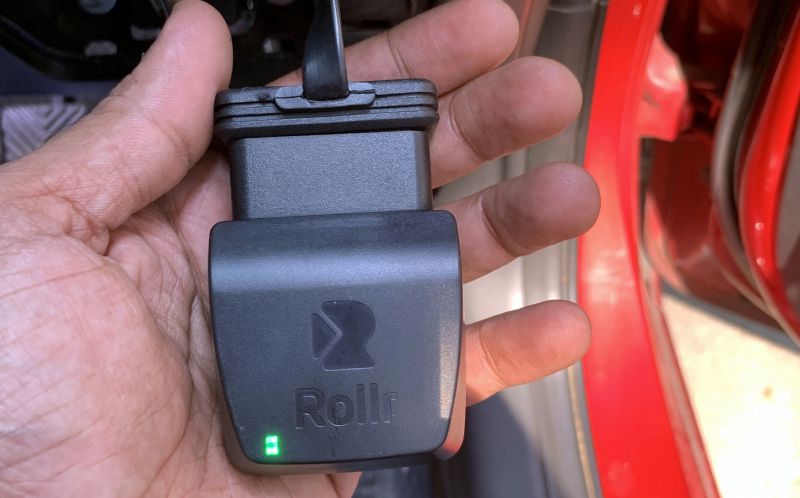Rollr Mini review: A personal vehicle assistant on your smartphone
The Rollr Mini is an OBD device that plugs into your car's computer using the OBD II port.;

Rollr Mini, a name that may not sound as familiar to most Indians out there. This device is a product of parts manufacturer and service provider Samvardhana Motherson and is a Made in India project that aims to protect vehicle drivers on and off the road. The device is nothing but a simple OBD device that is embedded with a GPD tracking chip and a GSM SIM card for basic internet connectivity. It communicates with the company’s servers to send information such as engine health and GPS locations apart from a few other features and routes the data to the vehicle owner. This data is broken down into information that the vehicle owner can use on his smartphone. The data provides a location of the car in real time, the car’s engine health and a few other parameters. It lacks Bluetooth connectivity and relies completely on the internet path to send information to the owner’s smartphone. In the end, the device promises a better car ownership at very affordable prices.

The Rollr Mini is an OBD device that plugs into your car’s computer using the OBD II port that is located below the dashboard. This port is a diagnostics port that connects to a compatible hardware and sensors around the car feed this information to the software. The data pronounces the car's health if they are functioning perfectly or if there is a service required. This data is only accessible to car service centres and not to the driver or owner of the vehicle. In order for the owner to have this feature with him, he could opt for a third-party OBD device and monitor his car’s health and progress on his smartphone or laptop.

The Rollr Mini is this very OBD device that combines the power of GPS and an internet connection that works as the main interface. It sends all the information to the servers back at the call centre where the data is crunched into analysis and sent back to the owner’s app.

All you need to do is purchase a Rollr Mini device, and simply locate the OBD port in your car and plug it in. before you do so, make sure your car is compatible, or call the company for help. The car manual should help you with most information on that, but most cars purchased around 2014 and onwards should be compatible. Once you plug in the device to the OBD II port, you will notice a green notification LED lighting up. This is the power indicator that lights up even when the car is not turned on.
The SIM card within the device connects over the company’s partner telecom ISPs for an internet connection and latches up with the servers. Since the company provides the internet connection for the service period of one year, the user does not need to do anything or pay for anything more. Once you install the app, all you need to do is follow the registration procedure on the screen and register and lock the Rollr Mini OBD to your account. You are set and ready to shut the dashboard and forget about it. Sadly, the device does not come with an extension cable bundled — so if your car has no space to accommodate the Rollr Mini comfortably, you may need to purchase an extension cord/cable from the market, which should cost around Rs 500 or less. The device comes with a one-year subscription model included in the cost, and you need to renew the subscription on a yearly basis. There are two types of services available — app only and app + SMS, where notifications can also be reported to you via SMS texts in case you are not in a data zone. The Rollr Mini is priced at Rs 6,499 for the hardware and one-year service package, while the yearly subscriptions are available for Rs 1,200 (under discount) or Rs 1,800 (if no discounts are available).
The Rollr Mini keeps recording data as and when you start your engine, roll on and stop. The app is feature rich and gives you various crucial information such as engine turn on every time the engine is started, over speeding (if activated from the app), a geographical area crossed by the vehicle (if Geofence is activated from the app), engine health and logging trips, time, route and driving statistics such as hard breaking, excess acceleration, etc. Using the app is a no-brainer — even a new customer/user will get to know the features within a few days of use.
The car’s engine health is always in check each time you drive. Sensors inside the engine and around the car send the required information back to the app. These include engine malfunction, engine temperature, battery health, coolant temperature, ambient temperature, fuel level and a lot more. However, all this information depends purely on your car model and if your car has the respective sensors. Most high-end and luxury cars usually have sensors for everything and the dashboard itself has a mini computer that reads it out to the driver.
Using the above information on the engine health, you can know the status of your engine well in advance. If your engine and coolant are running hot, you would be alerted in advance so that you can get it inspected from your service centre rather than being stranded on the road without this information. Similarly, your battery health and fuel levels are also informed which can be a lifesaver if you are out for an urgent long trip.
You can also monitor your driving style and understand the engine more closely in order to save fuel. For example, the app gives you information on how long your engine has been idling, if you braked suddenly, or accelerated out of need, etc. These driving habits can be found out and controlled for a better and safer driving experience. Additionally, the map in the trip information on the app also gives you information where the car was idling, braked too hard or over speeded. So if your car is driven by your chauffeur or a spouse, you can remotely track and understand the driver’s riding habits and know if your car is in safe hands. The device also features crash detection and sends information back to the app in case the car happens to be in an accident. This is very beneficial for those who rely on chauffeurs and want to keep a tab on the passengers.
The device also has a live vehicle tracking option where you can find out where your car is at that given moment. Due to latency issues in internet connections in certain areas, dead spots or no service, you will unfortunately not receive this information in real time. We also did notice that the real-time information is slightly delayed — around 3 – 5 minutes, and in certain cases, more than 10 minutes. This could be blamed on GPS and data connection issues due to underpasses and no coverage areas, but in our case, we would rule that out in most cases. The company should look into the case with their telecom provider or with possible firmware updates.
You can also give the Rollr Mini access to your spouse. The app can be installed and used on the same account by up to three users. Now each person can keep a tab on the car and their loved ones in it. You can also invite users/friends and employers (if needed) to view your rolls. You can share your location from the Rollr app so that your loved ones or those concerned can also keep a tab on your location and driving patterns in case of any casualties.
While using the Rollr Mini in our car, we found it to be pretty convenient and feature rich. However, we are also using a competitor brand that can do identical and more, for almost the same price. The competition brand also features Bluetooth connectivity to connect directly to the smartphone and also has the feature to remotely ping the car live and get an engine status at the given time. Lastly, the rival also has benefits over the Rollr Mini. This includes on-road assistance (if you have a puncture, breakdown or run out of fuel) and all you need to do is call the help desk and help will arrive soon. Additionally, it also features accident detection and callback where the help desk will locate you on GPS and send help and will also send information to your emergency contacts with the GPS location. And lastly, it also has towing alerts to inform you if the RTO has picked up your vehicle or if it is stolen.
However, the Rollr Mini does have a few advantages over the competition. You can deep dive into the analytic data that is stored on your phone or the servers to check out detailed information about your driving skills. This data gives you insights of how you drove, where you probably over speeded, hard braked and even idled your engine to save petrol and increase the life of your engine. Additionally, with the data in hand, you can also see where you can reroute your journey and save on time and fuel. Vehicle fleet owners can keep a tab on drivers who are not taking care of the car and its passengers and can be either taken to book or given additional training to be a safer driver. You can see perimeter crosses, speed limits broken, and unnecessary diversions and idling too. Based on a weekly and monthly report, the app automatically analyses these readings and more, to give you a driving score, and how you can improve your driving skills apart from staying safe and keeping your car and its engine in top shape.
After testing the product and checking out the features, we arrived at a conclusion that the rival brand, though expensive by Rs 1,000, probably seems like a better buy over the Rollr Mini. These include roadside assistance, accident alert and call back, towing alerts and a few more. However, Rollr Mini also has services available for transport vehicles and businesses who own a fleet of cars, which also makes it a better deal. With more detailed data such as hard braking, idling, speeding and hard accelerations, the Rollr mini is something that can benefit you in the longer run. If you want to keep your car and its passengers safe, improve your driving skills or keep a tab on your driver(s), the Rollr Mini is a good investment that will cost you a one-time hardware of Rs 6,499 and a yearly service of Rs 1,200.

